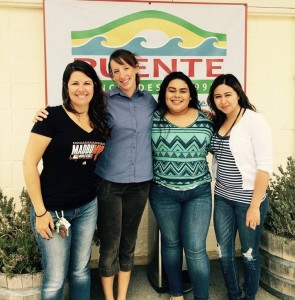Ivan Ortega remembers the 6-month period he went without health insurance, and how it turned his world into a bad dream. The 19-year-old (who was in high school at the time) suddenly had to curtail his favorite activity: sports. He couldn’t afford an injury – or even an illness – because his parents couldn’t foot the hospital bill.
“It felt like forever. I couldn’t do anything. It felt like I had to be wrapped in a bubble so I wouldn’t get hurt,” he recalls.
As a youth, Ortega actually lost his health insurance coverage twice – once when his dad lost his job, and another time when the family missed a single month’s payment and he was disenrolled.
Now Ortega has health care through Kaiser Permanente, which he chose as a newly enrolled adult under Covered California. He pays $75 a month and can do as many sports as he likes. His coverage is not contingent on either of his parents. He stands on his own two feet, and it feels great.
“It’s good, because I feel I should be paying for this on my own – my health insurance, my car insurance. I want to be more independent,” says Ortega, who is a Program Assistant with Puente and also a college student.
Ortega’s story illustrates how satisfying – not to mention secure and responsible – it feels to invest in health insurance, for your own sake and that of your family. That’s the message Puente is sending this season during the open enrollment period for health care through Covered California, which began November 1 and lasts through January 31, 2016. During that time, Californians can renew their coverage, choose a new plan, or apply for subsidized coverage or a tax credit, based on their income.
Puente is gearing up for an outreach campaign directed at South Coast residents who may still not have coverage or aren’t happy with the plan they have. Puente’s new team of community health workers, also known as Promotoras de Salud, will go door-to-door with flyers and educate people about why they might qualify for Covered California.
If they do, Puente can help sign them up. And that’s only one option. Puente staff also process new applications for Medi-Cal. They help participants apply for (or renew) their coverage under ACE (Access for Everyone) and Healthy Kids, two subsidized programs that are available to undocumented residents of San Mateo County.
Puente’s overall health strategy includes a major push to get locals enrolled in some kind of health insurance program – which is key to getting people into the habit of seeing a doctor before a chronic illness, like diabetes, becomes a disability. A Puente community health survey in 2013 revealed that at least 19 percent of South Coast residents didn’t have health insurance. And that 40 percent of adults had not seen their primary care doctor in the past year.
Those numbers have greatly improved since then. In 2014, Puente enrolled or renewed health coverage for 141 local participants. That number has climbed to 205 participants so far this year, with two months left to go. Laura Rodriguez, Puente Community Resource Navigator, predicts that as many as 250 people will have health care by the end of December.
And best of all, people are actually using their health insurance to seek out a doctor – some for the first time in their lives.
“I’ve noticed that, for a lot of our participants who haven’t had a physical before, once they got Covered California, they went seeking medical services. They say, ‘We’re paying for it – might as well use it.’ And some of them have been consistently using it,” says Rodriguez.
Puente vastly expanded its health care education and field outreach programs in 2013, and they are coming to fruition under the leadership of Molly Wolfes, Puente’s first-ever Community Health Coordinator. She joined Puente via a generous grant from Lucile Packard Children’s Hospital Stanford.
Puente now has a doctor in the house every Thursday evening, and that has made a huge difference as well. San Mateo County’s new Coastside Clinic in Pescadero has two exam rooms housed in a Puente portable. It has been booked up since it opened in March, as word gets around that there is a convenient way to see a doctor in the center of town. The clinic serves patients without private insurance. Both the clinic and the Promotoras are funded by San Mateo County Measure A grants.
“I have seen a lot of people come into the clinic who have never been to Puente before, and even some who have their first doctor’s visit in 20-40 years or ever,” says Wolfes. “After their first physical, they can access additional care and services such as going to an ophthalmologist, a nutritionist, or OB/GYN. The community is beginning to realize the services that are available once you have insurance and can take care of the health conditions they have gotten so use to living with.”

Molly Wolfes, left, and Laura Rodriguez, second from right, with Stanford fellow Martell Hesketh, and former Puente staff member Monica Amezcua, right
Wolfes believes that accessing health insurance has empowered Puente’s participants by helping them take control of their health through access to the tools they need to take care of themselves and their families.
But it’s not without some challenges. Rodriguez reports that several families who are enrolled in Kaiser through Covered California have not been receiving their invoices because their mail comes to their post office box — the only mail delivery for most of the rural South Coast. As a result, they have struggled to pay their monthly premiums on time and were disenrolled without their knowledge.
Puente has been helping manage their cases, but it’s been “frustrating,” says Rodriguez. “The agencies can’t talk with each other. We don’t have access to them and we can’t see what is going on in between.”
Some families have even said they would rather go without health insurance next year and pay the tax penalty than go through all that hassle. But Rodriguez thinks they may change their minds. Last year, the household tax penalty for forgoing health care under the Affordable Care Act was $285 per family. This year, it’s $695.
Ortega has also had trouble receiving his bills from Kaiser, and he still hasn’t received his membership card, even though he has been enrolled for 6 months. “It’s been really weird. They keep sending me back and forth,” he says.
Still, he has managed to see his doctor for a check-up. He figured out a way to pay his bills online before they come due. “It’s a lot better than not having insurance,” he says.
At Puente, we believe that people ultimately want what’s best for their families, and that means staying healthy for a long, long time.
“That’s the most important thing – being here for your family,” says Rodriguez. “You need to go the doctor and get your checkup. Because if there’s a chance for your family to have a better future, this is part of it.”
Support for Puente’s health and wellness coverage and prevention programs comes from the Gordon and Betty Moore Foundation, San Mateo County: Health Coverage Unit, Healthcare for the Homeless/Farmworker Health Program and Measure A, Kaiser Permanente, Mills-Peninsula Health Services/Palo Alto Medical Foundation, Lucile Packard Children’s Hospital Stanford, and individual donations.





